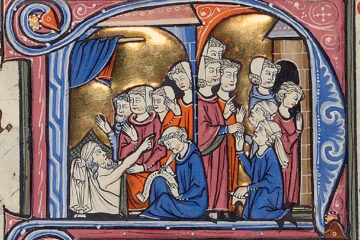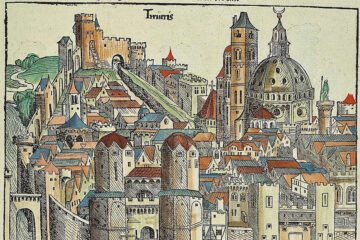Love is a curious thing. It can happen to anyone at any time. Usually, the way this starts is that two young people start to fancy one another. Typically, these are people and families they already know. At very young ages, they will tease each other, and eventually, as the years go by and as both the boy and the girl turn into a man and a woman, the process of official courtship will begin. Though the custom is that a man must ask his love’s parents for approval, few couples go down that route. Instead, young and fledgling love is a thing of clandestine moonlit meetings, notes passed to and from each other, and looks exchanged under the pressure of unruly hearts. Eventually, when the burden of secrecy becomes too much for both man and woman, the man will ask his love’s parents for her hand. If they see him as a worthy man, if he is from a fair family, has a strong profession, and is of earnest character, then usually the father gives the young man permission to see his daughter. If they are destined to be, the young couple will soon become joined in marriage. The young man usually proposes by kneeling and offering the woman a ring, asking her if she will be his. In Rosewood it is customary for both families to celebrate a night of song and dance, with the young couple traditionally drinking from the same cup (in any other case, drinking from someone else’s cup is seen as offensive).
Those highborn experience love in a different manner. To the common man, love is an essential part of life. However, the nobility sees love and union as weapons in politics. What better way to secure the wild lord at your nation’s south than to join your two houses? The primary mode of alliance and seizure is marriage. For this, a nobleman must have many sons and daughters so as to increase his reach. While commoners tend to get married around 18-25, a nobleman’s children will be betrothed extremely early, before the age of 10, and they will be married when they come of age, at 14 or 15 years. Courting is official and prescribed. The man delivers gifts to the woman’s family as a show of power and status. The dowry is paid to the man’s family. The young man courts his betrothed by fighting in tourneys, reciting stories and poems, taking her on expensive trips, or by other luxurious means. Unlike their commoner counterparts, noblemen and noblewoman don’t really get to know who they are marrying until they are already in said marriage. This is not to say that love never exists in these betrothals, but it is a rare thing, something both parties must work toward.
The marriage process is more or less the same, regardless of station. The only difference is the extravagance of the event. You can surely imagine that the King’s wedding would bring in a great crowd than a fletcher’s daughter finally getting a husband. In both cases, an ordained priest must be present, along with witnesses which are usually the groom and bride’s families. The groom enters the church, or holy place, followed by his man of honor, his groomsmen, his bride’s maid of honor, her bridesmaids, the ringbearer, and the flowermaidens. After everyone has entered, the bride is escorted by her father down the aisle and handed over to the groom. The entire congregation is then led into Mass by the priest, who signs the cross and recites, along with everyone, the Kyrie and Gloria hymns. Then the man and maid of honor recite a passage from the Bible, one from the Old and one from the New Testament. All then rise and the priest reads a passage in Latin from the Gospels of the Evangelists, usually about love or marriage. Once the priest is finished, everyone is seated again as the priest delivers a sermon on the gospel and comments about love and marriage and the young couple being married. The priest will introduce and then recite the vows and the couple will repeat after him:
Have you come here freely and without reservation to give yourselves to each other in marriage?
Will you respect and honor each other as husband and wife for the rest of your lives?
Will you lovingly accept the children sent to you by our Lord God and bring them up according to the law of Jesus Christ and His Church?
I, (name), take you, (name), as my husband/wife. I promise to be true to you in good times and in bad, in sickness and in health. I swear I will love and honor you from this day until the end of my days.
Marital Vows in Rosewood
The ringbearer brings the rings to the priest who blesses them before the newlyweds place them on each other’s fingers. As they give each other their ring, they both recite:
“In the name of the Father, the Son, and the Holy Spirit, take this ring as a sign of my undying love and eternal faithfulness in the face of all things that might come between us. From now on, I am yours and you are mine.”
The priest then officially pronounces the couple as husband and wife and the two exchange a kiss before a usually happy congregation. For commoners, the entire tradition is fun, full of singing and dancing, people making jokes, drinks, laughter, smiles, and congratulations. The nobility usually goes through this process with a degree of seriousness, which only increases as the social rank of the bride and groom increases. Another key difference is the consummation. To fully seal a marriage, the bride and the groom must lie together. For commoners, this happens after the marriage celebration, when the guests have gone and the newlyweds are left alone. Noble marriages usually have a “public” consummation, wherein a number of witnesses of the groom and the bride watch as the two consummate their marriage to make sure that everything was followed correctly.
Both husband and wife, upon getting married, enter into a marriage debt. The husband and wife are expected to produce children with each other. Both are expected to support one another and uphold their good name. They may not cheat one another or go their separate ways. Marriages are based on trust, honor, and love.
There are ways for a marriage to end. Divorce by request is the rarest. Legally, only the Pope can carry out a divorce, but in reality, some Bishops practice this as well. The most common divorce is divorce by annulment, wherein a union is considered unlawful and rendered void. Any ordained priest can annul a marriage, but there must be a reason for it. The most common reasons are:
- One or both spouses are already in a marriage
- One or both spouses are divorced by request
- The spouses are related by blood or spirit (first cousins, godparents, etc.)
- One or both spouses are found to be unable to produce children
- One or both spouses commit a marital crime like adultery
- One or both spouses were wed before they came of age
- The marriage was carried out in secret or without witnesses
- The marriage is based on deceit (concerning the dowry, the spouses’ religion, etc.)
- The marriage ceremony was carried out incorrectly or by someone who is not ordained
Usually, divorce is the very last option in rough marriages. Priests and advisors will often separate the two spouses, physically, and let them live apart for a few months/years rather than go through with a divorce. If a person is divorced by annulment, they may remarry. However, those who were divorced by request are not free to remarry, legally. Since most of them are nobles and usually powerful ones, they don’t take that rule to heart.
When someone’s spouse dies, they become a widow/widower and they inherit their spouse’s property. They can remarry, but only after forty days have passed since their late spouse was buried.
What of those men who prefer the company of other men and women who prefer women? While the Church does not recognize their love or their unions, people are people and will seek passion and fulfillment wherever they can. These relationships must remain hidden from the prying eyes of the public, but that does not diminish their existence or their fervor. Many of them end up choosing to marry traditionally but hold affairs with their lovers in secret. Commoners who are found out can be punished heavily. However, there are times when families will keep their sons’ and daughters’ secrets to protect their lives and their honor. Unfortunately, it is also common for these men and women to be betrayed by their families who worry for their souls. Noblemen and noblewomen of queer tastes often enjoy more liberty based on the power they hold. Without anyone breathing down their shoulders, these lords and ladies may end up spending their entire lives in the arms of the person they truly love, if they are lucky enough.


